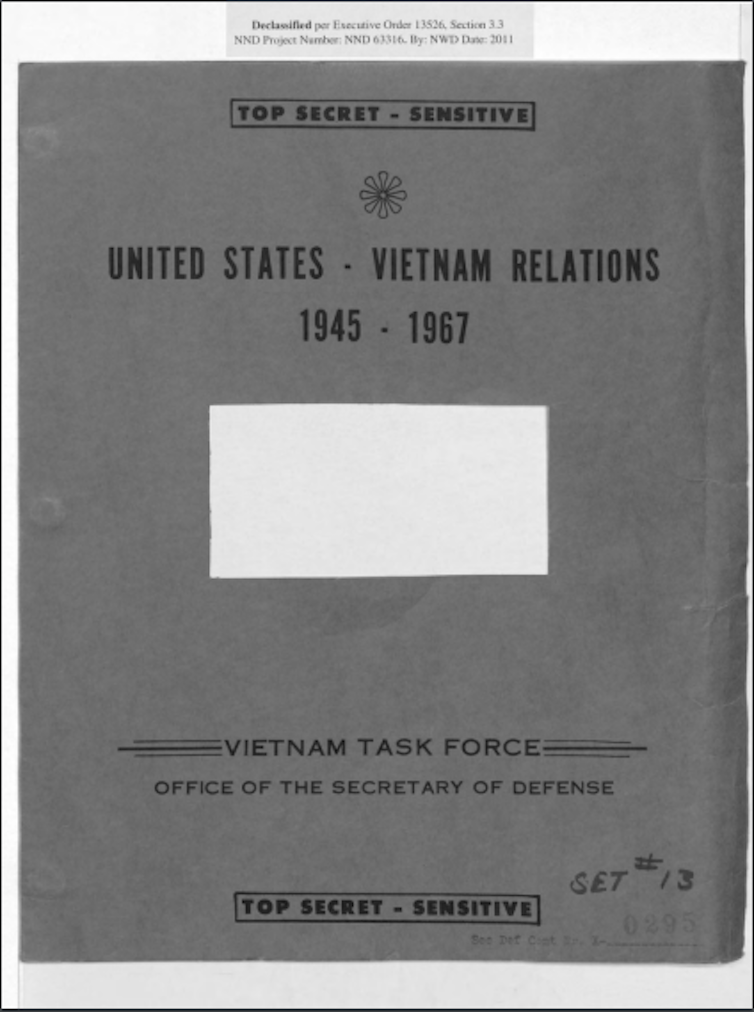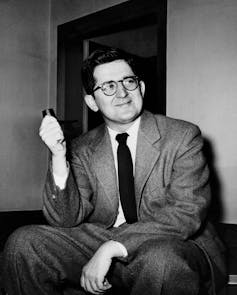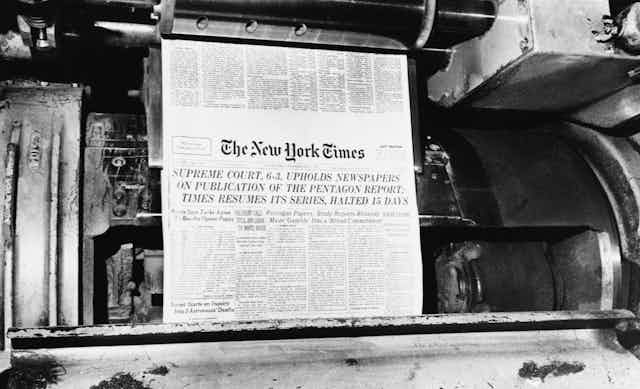The late Daniel Ellsberg was a former government contractor who leaked the classified history of the Vietnam War known as the Pentagon Papers to The New York Times.
In doing so, Ellsberg, who died on June 16, accelerated a shift in public opinion against U.S. involvement in the Vietnam War and, some historians argue, led the Nixon administration to become ever more paranoid and secretive, eventually leading to the Watergate scandal and Nixon’s resignation.
But perhaps the most lasting effect the publication of the Pentagon Papers had was on The New York Times, which had been a solidly pro-establishment newspaper.
The Times almost chose not to publish the papers, since the editor and publisher worried about being sued or prosecuted by the federal government. But they also worried about ruining the international reputation of the U.S., which had reached new highs after World War II.
The leadership of the Times in the early 1970s was a generation older than the younger reporters who agitated for change from within and from without. They saw the stodgy, institutional Times as unable to accurately portray the turmoil of the 1960s and 1970s and pushed for the paper to reform itself to better speak to younger readers.
The decision to publish did not destroy the Times or the global standing of the U.S. It did begin to chip away at the hidebound paper’s reluctance to change too quickly or to damage political ties to the establishment.
While The New York Times is still slow to change, even more than 50 years after the Pentagon Papers affair, the incident did demonstrate that the paper was willing to jeopardize its connections to other powerful institutions, including the government, in order to serve the greater good – the public interest.

The conservative New York Times?
I am a historian of American journalism who has studied the turbulent 1960s and early 1970s and the turmoil it created in news organizations, and I have written about the Pentagon Papers and The New York Times’ publication process. I based this research on the journal of A.M. “Abe” Rosenthal, who was the top editor at the paper during this period. Rosenthal’s journal is held at the New York Public Library.
To those who charge – wrongly – that The New York Times is a left-wing mouthpiece, it may come as a surprise that The New York Times of 1971 was a conservative institution, unwilling to make waves or make itself the story. The paper’s editorial and business leadership was also fairly politically conservative.
Harrison Salisbury, who was then an associate editor at the paper, recalled the politics of the paper’s executives and top editors in his 1980 memoir. None of the editors could “have won a prize in a flaming liberal contest,” he wrote. And Rosenthal was “the most conservative editor on the paper.” According to Salisbury, Rosenthal chafed at the counterculture and positioned himself “firmly against what he saw as shapeless anarchy swirling up from the streets.”
In the pages of the Times, this manifested as pro-establishment stories.
Times reporter and Pulitzer Prize winner David Halberstam criticized his employer for choosing the government’s version of events in Vietnam over what Halberstam knew from his reporting to be true.
J. Anthony Lukas, another Pulitzer Prize winner for the paper, fought to characterize the trial of the Chicago 7, a prosecution of political agitators at the 1968 Democratic National Convention, as a political show trial. The Times insisted that Lukas take the trial at face value, as the government presented it, which agitated Lukas enough that he wrote a book about it.
The Pentagon Papers were the government’s version of the early days of the Vietnam War, but they were a version that the government had not released to the public. The Defense Department had commissioned a secret history of the Vietnam War in order to avoid making the same mistakes it had made in that war in the future.
This study was highly classified because the story it told was not the same story that President Lyndon Johnson’s administration had told to the public, to news organizations or even to Congress. Instead, the papers showed that the government had systematically lied.
When reporter Neil Sheehan photocopied all of the documents that Ellsberg had pilfered and made available to him, he did not immediately inform the Times’s top editor, or even Ellsberg himself. Sheehan knew that the papers were an explosive story, but he also knew that they were classified and that merely possessing them, let alone publishing them, would be a federal crime.
Ellsberg was certainly at risk of going to prison for smuggling them out, and the Times might also face substantial legal penalties. Rosenthal first heard of the papers in April 1971, at least a few weeks after Sheehan obtained them and long after Sheehan knew of their existence.
In his journal, Rosenthal wrote that the Times was “involved in one of the biggest, most voluminous and probably one of the saddest and most damaging stories it has ever confronted journalistically.”
Rosenthal immediately realized just how important the handling of the Pentagon Papers would be to the Times and for the country. In his journal, he ruminated on his loyalty to the Times and the risk that publishing the Pentagon Papers might damage or even destroy the paper if the government prosecuted individual reporters or editors – or successfully sued the Times out of business.

Challenging the establishment
The Times was not the only institution that might be damaged by publication. The reputation of the entire nation was at stake, and this caused Rosenthal more worry than protecting the paper.
He wondered if loyalty to country lay in “adhering to a set of long accepted rules and laws, designed not only to protect politicians in general but, to the minds of many, to protect the country itself? Or did it lie in facing a decision to break those rules and laws?” In other words, would breaking the government’s rules on classification make the United States stronger by forcing the country to publicly grapple with its shortcomings?
Rosenthal even worried for a time that the Pentagon Papers were fake, concocted by a student activist group to lure the Times into legal peril and public disrepute.
Rosenthal rented first one, and then two suites at a hotel in New York so that the writers and editors could work in total secrecy away from the paper’s newsroom, sorting through the papers and making sense of them. Editors, executives and lawyers debated over whether stories about the papers could or should be published at all.
Despite his own doubts, Rosenthal eventually decided to move ahead. He had to persuade the publisher, Arthur Ochs “Punch” Sulzberger, that the paper should run the stories, and Sulzberger agreed – against the advice of the paper’s law firm.
Rosenthal told Sulzberger that “it would make a mockery of everything we ever told reporters, because how could we possibly ask them to go out in search for the truth at a time when the ultimate truth, the biggest story ever presented to The Times, had been placed in our laps and we turned away from it out of fear of the consequences of publication?”
Ellsberg himself only learned the Times would publish their series on the Pentagon Papers when the pages of the first installment had already been set in type and prepared for publication. At that point, even the source of the documents couldn’t stop the presses.
For the Times, the Pentagon Papers stories were an early reform of many that would come under Rosenthal and his successors. The reforms tried to address the concerns of the younger generation of reporters who were better in touch with a changing United States. They included expanded arts and cultural coverage, better treatment of women’s issues, and accountability measures such as a daily corrections box.
Rosenthal, and ultimately the Times as a whole, recognized that as the nation and world changed, so must the Times, to fulfill its duty to the public – and the public interest.

